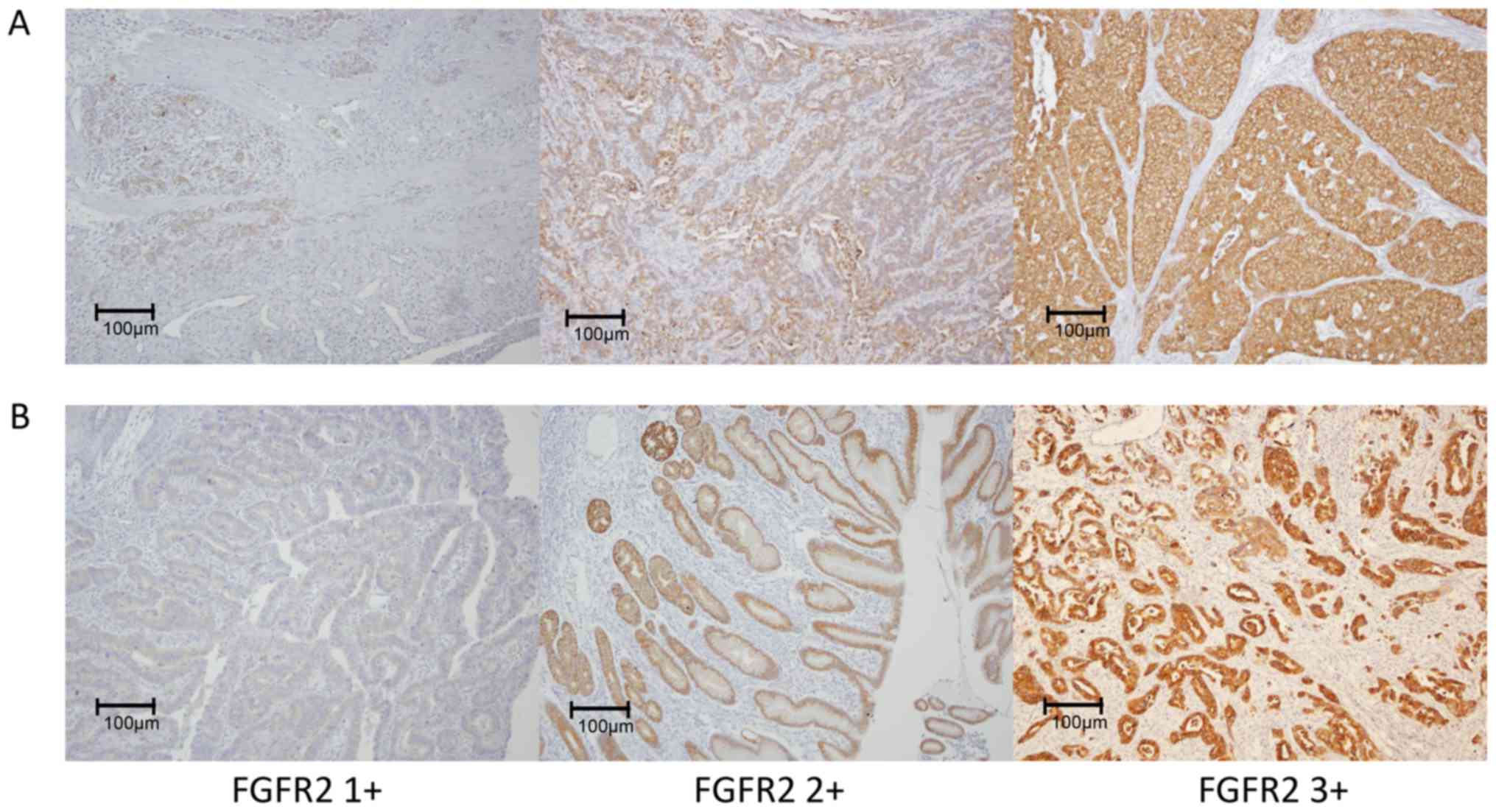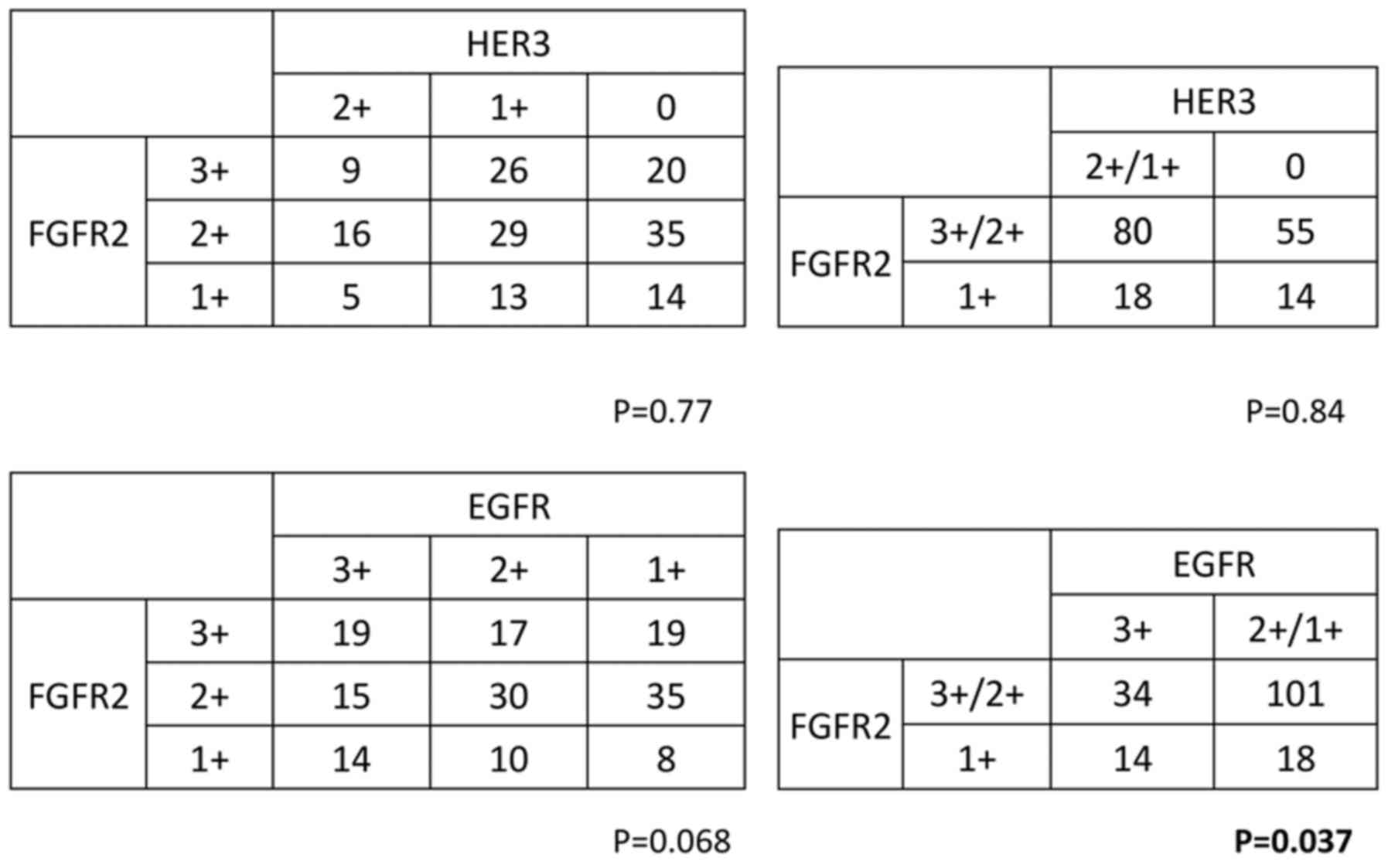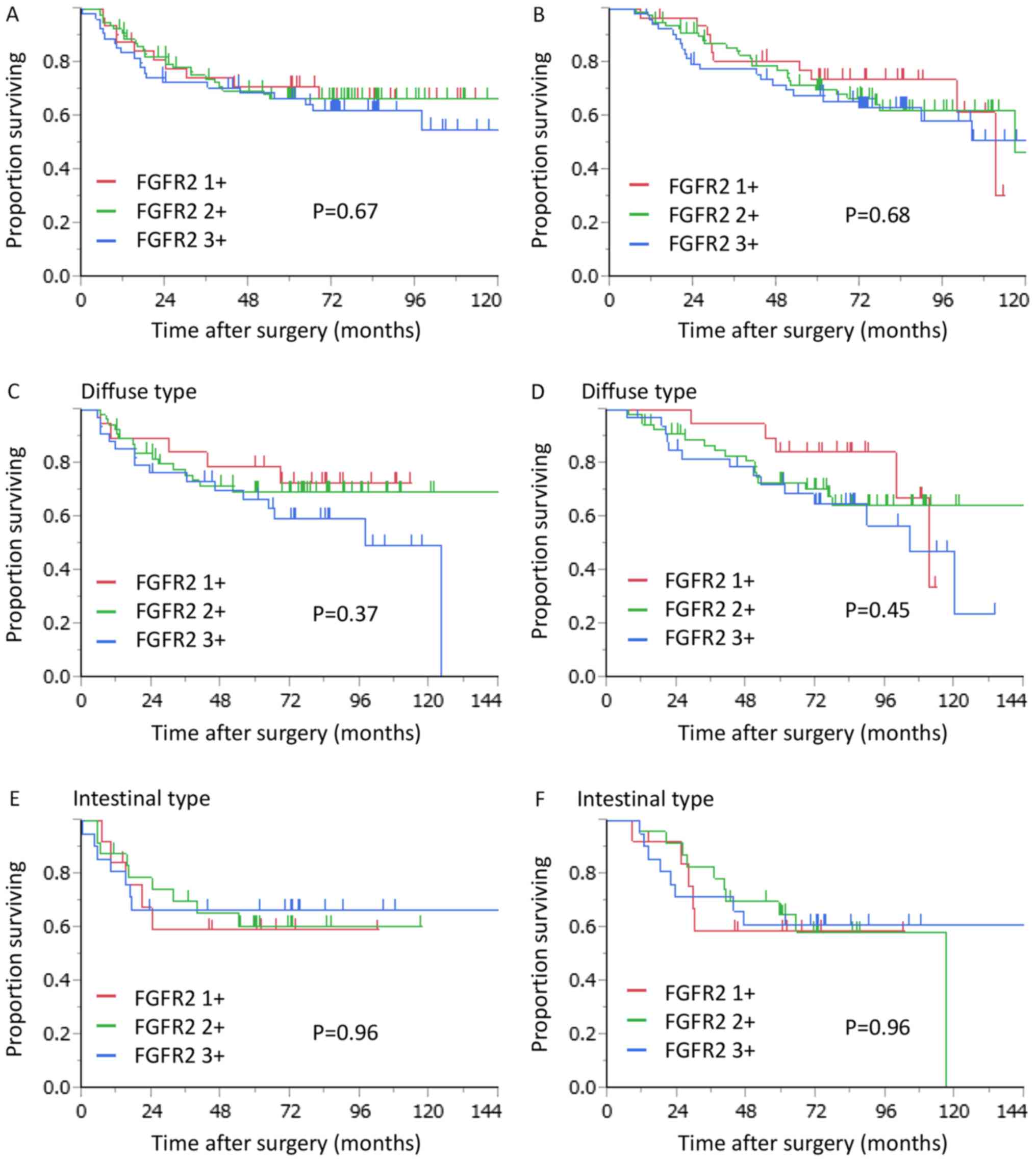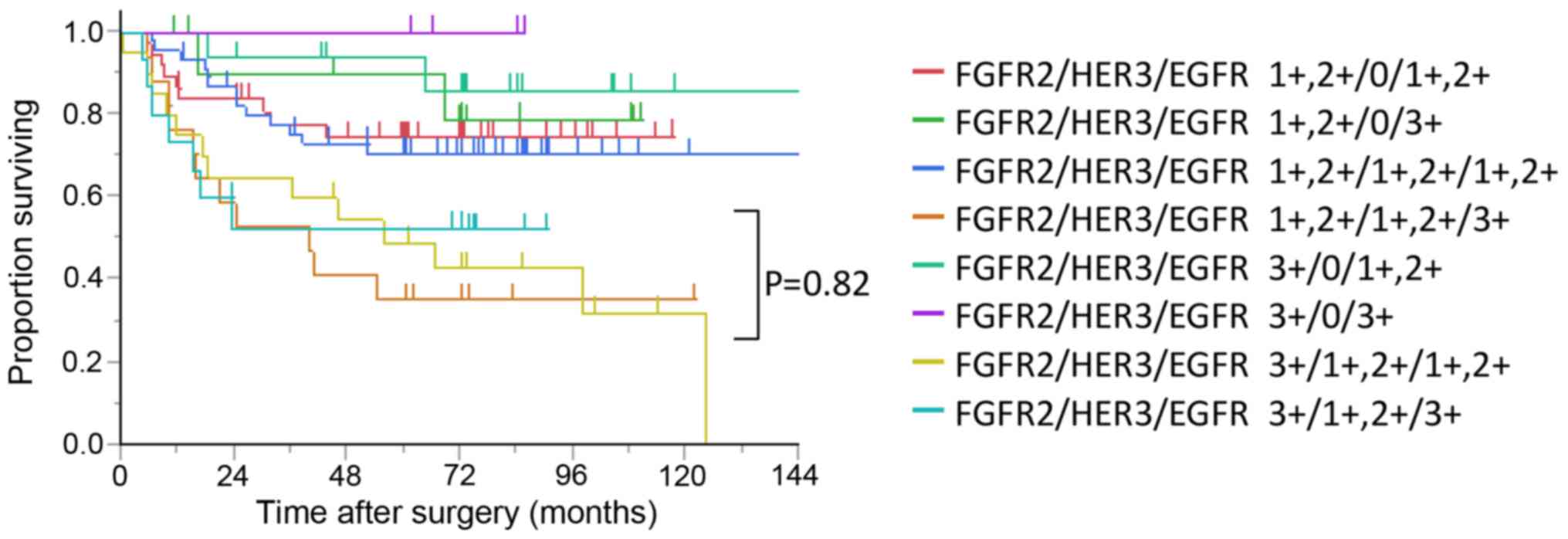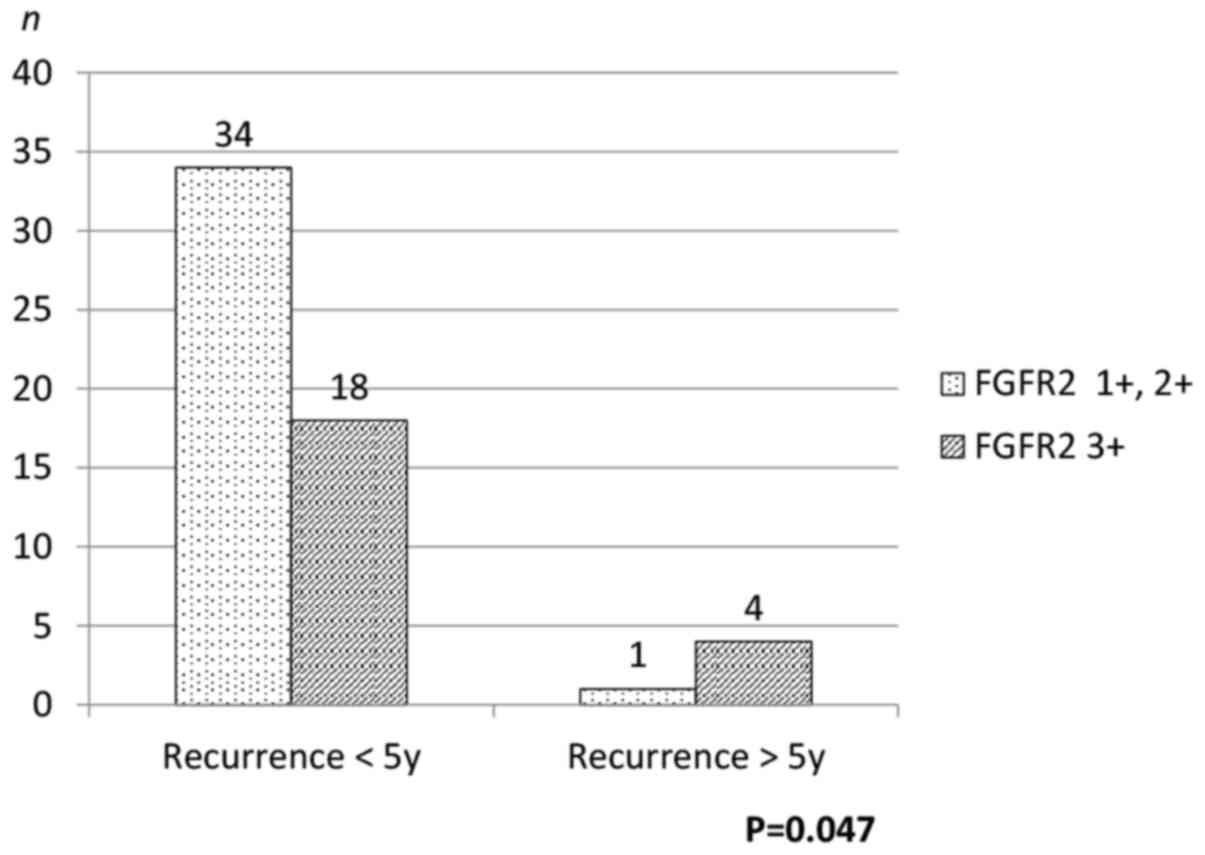|
1
|
Torre LA, Bray F, Siegel RL, Ferlay J,
Lortet-Tieulent J and Jemal A: Global cancer statistics, 2012. CA
Cancer J Clin. 65:87–108. 2015. View Article : Google Scholar : PubMed/NCBI
|
|
2
|
Sakuramoto S, Sasako M, Yamaguchi T,
Kinoshita T, Fujii M, Nashimoto A, Furukawa H, Nakajima T, Ohashi
Y, Imamura H, et al: Adjuvant chemotherapy for gastric cancer with
S-1, an oral fluoropyrimidine. N Engl J Med. 357:1810–1820. 2007.
View Article : Google Scholar : PubMed/NCBI
|
|
3
|
Sasako M, Sakuramoto S, Katai H, Kinoshita
T, Furukawa H, Yamaguchi T, Nashimoto A, Fujii M, Nakajima T and
Ohashi Y: Five-year outcomes of a randomized phase III trial
comparing adjuvant chemotherapy with S-1 versus surgery alone in
stage II or III gastric cancer. J Clin Oncol. 29:4387–4393. 2011.
View Article : Google Scholar : PubMed/NCBI
|
|
4
|
Goetz R and Mohammadi M: Exploring
mechanisms of FGF signalling through the lens of structural
biology. Nat Rev Mol Cell Biol. 14:166–180. 2013. View Article : Google Scholar : PubMed/NCBI
|
|
5
|
Dedes KJ, Wetterskog D, Ashworth A, Kaye
SB and Reis-Filho JS: Emerging therapeutic targets in endometrial
cancer. Nat Rev Clin Oncol. 8:261–271. 2011. View Article : Google Scholar : PubMed/NCBI
|
|
6
|
Eswarakumar VP, Lax I and Schlessinger J:
Cellular signaling by fibroblast growth factor receptors. Cytokine
Growth Factor Rev. 16:139–149. 2005. View Article : Google Scholar : PubMed/NCBI
|
|
7
|
Turner N and Grose R: Fibroblast growth
factor signalling: From development to cancer. Nat Rev Cancer.
10:116–129. 2010. View
Article : Google Scholar : PubMed/NCBI
|
|
8
|
Brooks AN, Kilgour E and Smith PD:
Molecular pathways: Fibroblast growth factor signaling: A new
therapeutic opportunity in cancer. Clin Cancer Res. 18:1855–1862.
2012. View Article : Google Scholar : PubMed/NCBI
|
|
9
|
Hattori Y, Odagiri H, Nakatani H, Miyagawa
K, Naito K, Sakamoto H, Katoh O, Yoshida T, Sugimura T and Terada
M: K-sam, an amplified gene in stomach cancer, is a member of the
heparin-binding growth factor receptor genes. Proc Natl Acad Sci
USA. 87:pp. 5983–5987. 1990; View Article : Google Scholar : PubMed/NCBI
|
|
10
|
Matsumoto K, Arao T, Hamaguchi T, Shimada
Y, Kato K, Oda I, Taniguchi H, Koizumi F, Yanagihara K, Sasaki H,
et al: FGFR2 gene amplification and clinicopathological features in
gastric cancer. Br J Cancer. 106:727–732. 2012. View Article : Google Scholar : PubMed/NCBI
|
|
11
|
Su X, Zhan P, Gavine PR, Morgan S, Womack
C, Ni X, Shen D, Bang YJ, Im SA, Ho Kim W, et al: FGFR2
amplification has prognostic significance in gastric cancer:
Results from a large international multicentre study. Br J Cancer.
110:967–975. 2014. View Article : Google Scholar : PubMed/NCBI
|
|
12
|
Zhao WM, Wang L, Park H, Chhim S,
Tanphanich M, Yashiro M and Kim KJ: Monoclonal antibodies to
fibroblast growth factor receptor 2 effectively inhibit growth of
gastric tumor xenografts. Clin Cancer Res. 16:5750–5758. 2010.
View Article : Google Scholar : PubMed/NCBI
|
|
13
|
Bai A, Meetze K, Vo NY, Kollipara S, Mazsa
EK, Winston WM, Weiler S, Poling LL, Chen T, Ismail NS, et al:
GP369, an FGFR2-IIIb-specific antibody, exhibits potent antitumor
activity against human cancers driven by activated FGFR2 signaling.
Cancer Res. 70:7630–7639. 2010. View Article : Google Scholar : PubMed/NCBI
|
|
14
|
Sommer A, Kopitz C, Schatz CA, Nising CF,
Mahlert C, Lerchen HG, Stelte-Ludwig B, Hammer S, Greven S,
Schuhmacher J, et al: Preclinical efficacy of the auristatin-based
antibody-drug conjugate BAY 1187982 for the treatment of
FGFR2-positive solid tumors. Cancer Res. 76:6331–6339. 2016.
View Article : Google Scholar : PubMed/NCBI
|
|
15
|
Chang J, Wang S, Zhang Z, Liu X, Wu Z,
Geng R, Ge X, Dai C, Liu R, Zhang Q, et al: Multiple receptor
tyrosine kinase activation attenuates therapeutic efficacy of the
fibroblast growth factor receptor 2 inhibitor AZD4547 in FGFR2
amplified gastric cancer. Oncotarget. 6:2009–2022. 2015. View Article : Google Scholar : PubMed/NCBI
|
|
16
|
Pearson A, Smyth E, Babina IS,
Herrera-Abreu MT, Tarazona N, Peckitt C, Kilgour E, Smith NR, Geh
C, Rooney C, et al: High-level clonal FGFR amplification and
response to FGFR inhibition in a translational clinical trial.
Cancer Discov. 6:838–851. 2016. View Article : Google Scholar : PubMed/NCBI
|
|
17
|
Kim ST, Jang HL, Lee SJ, Lee J, Choi YL,
Kim KM, Cho J, Park SH, Park YS, Lim HY, et al: Pazopanib, a novel
multitargeted kinase inhibitor, shows potent in vitro antitumor
activity in gastric cancer cell lines with FGFR2 amplification. Mol
Cancer Ther. 13:2527–2536. 2014. View Article : Google Scholar : PubMed/NCBI
|
|
18
|
Xie L, Su X, Zhang L, Yin X, Tang L, Zhang
X, Xu Y, Gao Z, Liu K, Zhou M, et al: FGFR2 gene amplification in
gastric cancer predicts sensitivity to the selective FGFR inhibitor
AZD4547. Clin Cancer Res. 19:2572–2583. 2013. View Article : Google Scholar : PubMed/NCBI
|
|
19
|
Zhang N, Chang Y, Rios A and An Z:
HER3/ErbB3, an emerging cancer therapeutic target. Acta Biochim
Biophys Sin (Shanghai). 48:39–48. 2016.PubMed/NCBI
|
|
20
|
Sithanandam G and Anderson LM: The ERBB3
receptor in cancer and cancer gene therapy. Cancer Gene Ther.
15:413–448. 2008. View Article : Google Scholar : PubMed/NCBI
|
|
21
|
Yoshioka T, Nishikawa Y, Ito R, Kawamata
M, Doi Y, Yamamoto Y, Yoshida M, Omori Y, Kotanagi H, Masuko T and
Enomoto K: Significance of integrin αvβ5 and erbB3 in enhanced cell
migration and liver metastasis of colon carcinomas stimulated by
hepatocyte-derived heregulin. Cancer Sci. 101:2011–2018. 2010.
View Article : Google Scholar : PubMed/NCBI
|
|
22
|
Ema A, Yamashita K, Ushiku H, Kojo K,
Minatani N, Kikuchi M, Mieno H, Moriya H, Hosoda K, Katada N, et
al: Immunohistochemical analysis of RTKs expression identified HER3
as a prognostic indicator of gastric cancer. Cancer Sci.
105:1591–1600. 2014. View Article : Google Scholar : PubMed/NCBI
|
|
23
|
Japanese Gastric Cancer Association, .
Japanese classification of gastric carcinoma-2nd english edition.
Gastric Cancer. 1:10–24. 1998. View Article : Google Scholar : PubMed/NCBI
|
|
24
|
Nagatsuma AK, Aizawa M, Kuwata T, Doi T,
Ohtsu A, Fujii H and Ochiai A: Expression profiles of HER2, EGFR,
MET and FGFR2 in a large cohort of patients with gastric
adenocarcinoma. Gastric Cancer. 18:227–238. 2015. View Article : Google Scholar : PubMed/NCBI
|
|
25
|
Inokuchi M, Murase H, Otsuki S, Kawano T
and Kojima K: Different clinical significance of FGFR1-4 expression
between diffuse-type and intestinal-type gastric cancer. World J
Surg Oncol. 15:22017. View Article : Google Scholar : PubMed/NCBI
|
|
26
|
Kunii K, Davis L, Gorenstein J, Hatch H,
Yashiro M, Di Bacco A, Elbi C and Lutterbach B: FGFR2-amplified
gastric cancer cell lines require FGFR2 and Erbb3 signaling for
growth and survival. Cancer Res. 68:2340–2348. 2008. View Article : Google Scholar : PubMed/NCBI
|
|
27
|
Adachi Y, Oshiro T, Mori M, Maehara Y and
Sugimachi K: Prediction of early and late recurrence after curative
resection for gastric carcinoma. Cancer. 77:2445–2448. 1996.
View Article : Google Scholar : PubMed/NCBI
|
|
28
|
Eom BW, Yoon H, Ryu KW, Lee JH, Cho SJ,
Lee JY, Kim CG, Choi IJ, Lee JS, Kook MC, et al: Predictors of
timing and patterns of recurrence after curative resection for
gastric cancer. Dig Surg. 27:481–486. 2010. View Article : Google Scholar : PubMed/NCBI
|
|
29
|
Choi JY, Ha TK and Kwon SJ:
Clinicopathologic characteristics of gastric cancer patients
according to the timing of the recurrence after curative surgery. J
Gastric Cancer. 11:46–54. 2011. View Article : Google Scholar : PubMed/NCBI
|
|
30
|
Aguirre-Ghiso JA: Models, mechanisms and
clinical evidence for cancer dormancy. Nat Rev Cancer. 7:834–846.
2007. View
Article : Google Scholar : PubMed/NCBI
|
|
31
|
Tegtmeyer N, Neddermann M, Asche CI and
Backert S: Subversion of host kinases: A key network in cellular
signaling hijacked by Helicobacter pylori CagA. Mol Microbiol.
105:358–372. 2017. View Article : Google Scholar : PubMed/NCBI
|















